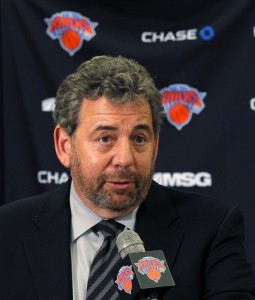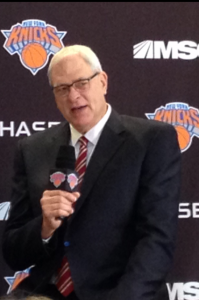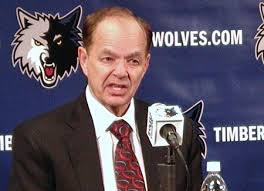 The Zen Master himself has returned to the NBA as the newest Big Kahuna of the Knicks. Of course, he is about the fifth in a long line of saviors who have entered the black hole known as the Knicks front office.
The Zen Master himself has returned to the NBA as the newest Big Kahuna of the Knicks. Of course, he is about the fifth in a long line of saviors who have entered the black hole known as the Knicks front office.
The job suffers from the common malady known as “responsibility without authority.” Basketball experts come and go under the whim of owner James Dolan, and the team is famous for its ability to go backward a lot faster than going forward.
Without a championship since 1973, what plagues the Knicks comes down from the top.
Into this mess comes Jackson with his 13 championships as a player and coach, including the last two the Knicks won just after World War I (or so it seems). He seems to have been given both responsibility and authority, so hopefully he can make some headway in bringing the Knicks back to the top.
Pro sports have an interesting history with owners, since so many owners have not been sports guys. In the original days of the league, many owners ran the team as their main business, like Danny Biasone of the Syracuse Nationals. As a result, most of the owners were basketball guys.
As teams grew in value, it became common for owners to be rich first, then buy a team as they would a trophy wife. They had something pretty to look at and fun to show off. Most of these owners were not basketball savvy, and as a player you hoped that they didn’t interfere too much.

 As team values got massive, they became a part of multi-national companies with interrelated entities. The new owners are all business, creating TV networks, marketing machines and merchandise empires. As a result, rebuilding cycles are shorter and “win now or be canned” attitudes has about a third of all coaches being fired each season.
As team values got massive, they became a part of multi-national companies with interrelated entities. The new owners are all business, creating TV networks, marketing machines and merchandise empires. As a result, rebuilding cycles are shorter and “win now or be canned” attitudes has about a third of all coaches being fired each season.
So what is Jackson to do about turning around the Knicks’ battleship? We all know that he is expert in the day-to-day team stuff. But what happens when he butts heads with Dolan for the first time?
At the start of my second season with the Jazz, we had the fourth pick in the draft and chose Dominique Wilkins. Wow, was I excited. At that point we had Adrian Dantley, “Dr. Dunkenstein” Darrell Griffith and now “The Human Highlight Film.” What a show.
Soon after, though, I heard that ‘Nique was traded to Atlanta for John Drew and Freeman Williams. Who made that knucklehead trade? Wilkins for those two? You’ve got to be kidding.
What seemed like the worst trade in history from the basketball side turned out to be strictly a business move. Included in the trade was $1 million, which was necessary to keep the Jazz from going out of business. In the middle of that season, I was traded to Denver for Rich Kelley and another wad of cash to keep the team afloat. Both moves were against the team’s best basketball interests, but in the best business interests.
In Denver, coach Doug Moe would very often run interference between the front office and the players. The marketing folks wanted the players to make dozens of appearances without much regard for the game schedule. It was typical that the best appearance times for the marketers were the worst times for the players. So Doug had to step in so the players could prepare to play instead of sign autographs during warmups.
 In my last season, I was waived by Minnesota because the team had lost eight in a row, so attendance dropped. Owner Glen Taylor panicked and ordered everyone without fully guaranteed contracts to be immediately waived. He saved about $700,000 in salary, which wasn’t much when you realize that the payroll was over $60 million.
In my last season, I was waived by Minnesota because the team had lost eight in a row, so attendance dropped. Owner Glen Taylor panicked and ordered everyone without fully guaranteed contracts to be immediately waived. He saved about $700,000 in salary, which wasn’t much when you realize that the payroll was over $60 million.
Unfortunately, the team’s starting center got hurt before the playoffs, so when they needed me there the most I was gone. The irony was that’s why they signed me in the first place – cheap insurance for their injury prone starter. So for a 1 percent savings, the Wolves lost a winnable playoff series. Plus they made a liar out of their GM, who promised me the week before I was cut that he was going to guarantee the rest of my contract. In that case, Taylor was caught signing Joe Smith to an illegal contract, and was suspended for a year and penalized with the loss of three first-round draft picks.
What makes pro sports unique is the specialized skill of the players. Traditional business practices don’t always translate well, and often times good business makes bad basketball. Successful businessmen can make troublesome owners.
The best owners usually pick the best GMs and let them do their thing. Unless an owner is tremendously basketball savvy, it’s a tough business.
Hopefully, Dolan learned his lesson. Good luck, Phil.
Danny Schayes is a retired 18-year-veteran of the NBA, a professional broadcaster and soon-to-be-published author now penning NBA columns for SheridanHoops. Follow him on Twitter.
MORE FROM DANNY SCHAYES:
BASKETBALL VS. MARKETING: IS THE TAIL WAGGING THE DOG?
WILL NEW FACES HELP IN INDIANA, L.A.? OR WILL WE SEE ADRIAN DANTLEY 2.0?
WHERE IS THE LOVE? SAG LAWYER AMONG CANDIDATES TO REPLACE HUNTER
ARE NBA PLAYERS GETTING PLAYED AGAIN AS UNION HUNTS FOR NEW CHIEF?
IN THE NBA, SOMETIMES YOU CAN GO HOME AGAIN
ARE TODAY’S GREAT SCORERS BETTER?
WHEN STARS GET HURT, IT’S BAD FOR THE LEAGUE
PARDON ME, BUT INDIANA-MIAMI MEANT NEXT TO NOTHING
WHAT IT’S REALLY LIKE TO BE TRADED
HAZING: IT’S A LOCKER ROOM, NOT AN ENCOUNTER GROUP
ADAM SILVER NEEDS TO EMBRACE THE NBA’S LIVING PIONEERS
Definitely imagine that that you stated. Your favorite reason appeared to be on the net the simplest factor to
be aware of. I say to you, I definitely get irked while
folks consider worries that they just do not realize about.
You controlled to hit the nail upon the highest and also outlined out the whole thing
without having side effect , other folks could take a signal.
Will probably be again to get more. Thank you